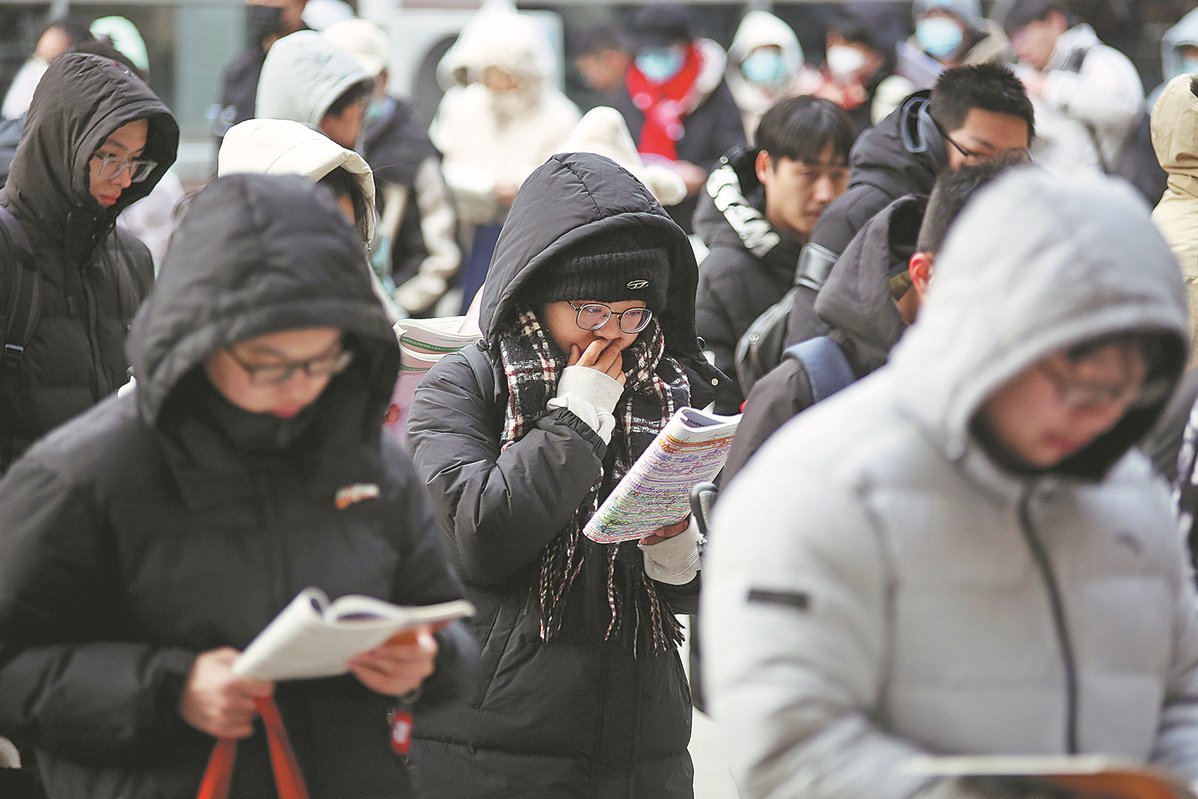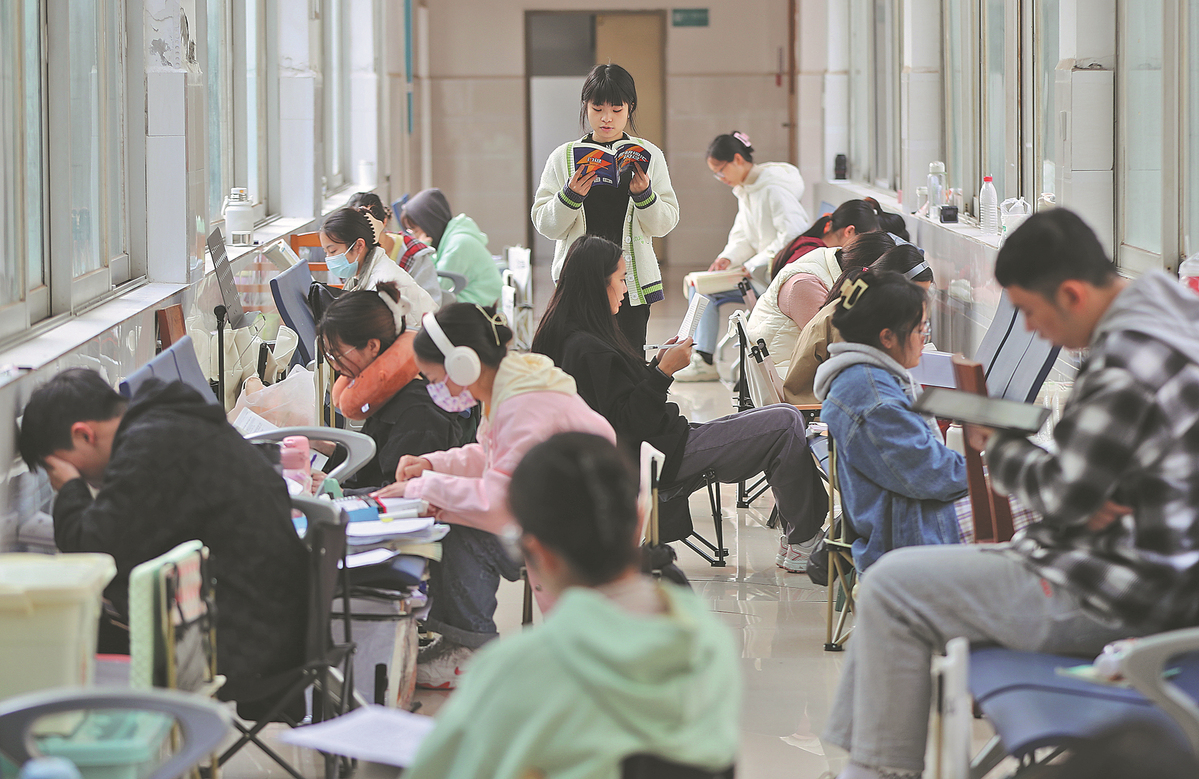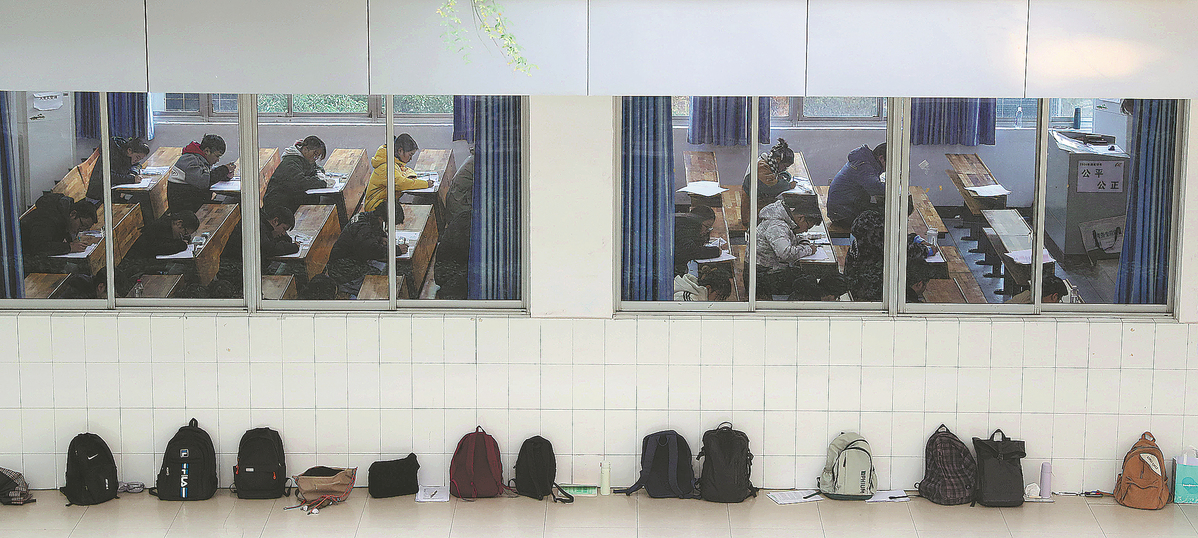Job security starts to supersede study

Students taking the postgraduate studies entrance exam glance at their textbooks before entering the examination rooms at Jiangsu University of Technology in Jiangsu Province on Dec 23. CHEN WEI/XINHUA
Yang Ziru, 22, had prepared for nearly a year to take the postgraduate studies entrance exam, but last month — 20 days before she was due to take the test — she abandoned her academic ambitions.
The journalism major from Chengdu, Sichuan Province, planned to study for a master's degree in philosophy, which she hoped would help her find a satisfying job and a good career.
"I gradually realized a master's degree in philosophy might limit my career options as I am determined to seek opportunities in the internet business after graduation," Yang said.
Her decision is indicative of an emerging trend of college graduates appearing more realistic about whether they need to pursue postgraduate studies.
On a freezing cold morning last month, graduates gathered at a testing station in Beijing flipping through textbooks as they nervously prepared for the postgraduate studies entrance exam. The scene was repeated nationwide.
However, this year's exam saw the number of applicants fall by 7.6 percent year-on-year to 4.38 million, the first drop in nine years, according to figures from the Ministry of Education.
The drop surprised many observers as the number of applicants for the exam had been increasing steadily since 2016, with an average annual growth rate of 15.8 percent from 2015 to 2022.
Chen Zhiwen, editor-in-chief of online education portal EOL, said the uncertain employment prospects of postgraduate students are one of the major reasons for the drop.
In the past, many young people expected to land a decent job by pursuing further education. But after earning higher degrees they found they faced similar employment challenges, or an even tougher job environment, than their undergraduate classmates, Chen said.
"In 2023, the number of postgraduate students has exceeded undergraduates. Students began to calculate the value of accomplishing a master's degree and if it may not guarantee a decent job — some gave up the attempt," he said.
It's a good thing that they didn't blindly follow the crowd but made rational choices instead, he added.
Real goals
Yang said another reason she quit the postgraduate entrance exam is that it would take three years for her to complete an academic master's degree.
On why fewer students applied for the postgraduate entrance exam last month, Yang said she thought it reflected a growing belief among them that academic degrees are not the only path to a secure future. "If employment is the final goal, we need to think about our choices from a different perspective," she said.
Yang said she learned from doing an internship the importance of work experience, as opposed to academic knowledge, when it came to employment. She now believes the master's degree she wanted to pursue was too academic for the job market.
While the time it takes to complete an academic master's degree stops some applicants, the financial cost of a professional master's is also a major consideration, said Chen from EOL.
The average annual tuition fee for an academic master's degree is 8,000 yuan ($1,126) and for a professional one 12,000 yuan, according to the Education Ministry. Academic master's degree students are provided with dormitories with an annual rent of around 1,500 yuan, but professional degree students in some colleges have to rent an apartment themselves.
"Aiming to cultivate students' practical skills, professional master's degrees usually cost more and cannot get national subsidies. The rising costs force students to calculate the true value of a master's degree," Chen said.

Students prepare for the postgraduate entrance exam in the library of the University of South China in Hunan Province on Nov 23. CAO ZHENGPING/XINHUA
Refocusing
China's enrollment for professional master's degrees, which emphasize the practical application of knowledge and skills, will be increased to about two-thirds of all master's degree programs by 2025, the education ministry said in late December.
This structural adjustment of master's degrees is inevitably affecting students' choices. Fortunately, more young people are aware that they are entitled to make their own choices on education. "I believe we should find the path that is suitable for each individual, though none of these goals are easy to achieve, and struggle for our dreams," Yang said.
Having no interest in academic research or working at government-related institutions, Yang is now preparing to study abroad and plans to get an internship with an internet company.
While fewer students took the exam for postgraduate studies last year, more registered for the annual civil service recruitment examination to compete for vacancies at central authorities and their branches.
The National Civil Service Administration said 3.03 million applicants were eligible to take the test in 2023, a year-on-year increase of 16.8 percent. In November, about 2.25 million applicants took the exam.
The country plans to recruit 39,600 civil servants this year, a 6.7 percent increase from the previous year. However, it's a fiercely competitive process as the job-to-applicant ratio is about 1 to 57.
Chen said more and more graduates began to realize the importance of obtaining a secure job in recent years due to the COVID-19 pandemic and other factors. Examinations for public service and other government-related jobs have gained in popularity.
"Obtaining a postgraduate degree may not earn a promising career, but by taking the test for civil servants' recruitment, it's possible to directly hit the goal. So, some students give up the postgraduate studies exam if they cannot take both exams," Chen said.

Students take the postgraduate entrance exam at the University of South China on Dec 23. CAO ZHENGPING/XINHUA
Seeking certainty
Zhou Xintong from Shandong Province decided not to take the postgraduate studies exam and instead is preparing for the provincial authorities recruitment exam in spring because it "has more certainty".
Based in a populous province renowned for the competitiveness of its provincial exams, Zhou discovered in November that six of her classmates studying Chinese language and literature intended to apply for the same university she was aiming to get into.
Due to a lack of confidence in her English proficiency, Zhou said she worried every night about failing the exam and having no time to prepare for other recruitment tests.
"Frankly speaking, with a goal of seeking certainty, I can't afford to take the risk," Zhou said.
For graduate students there are many avenues to get into the civil service. Central authorities and their branches recruit students through the national civil service exam. However, they can also take exams for provincial authorities and positions at local government-related institutions as a backup.
"No matter what the choice is, I don't want to end up with nowhere to go after graduation," she said.
Figures from the Education Ministry show the number of China's college graduates in 2024 is expected to reach 11.79 million, a year-on-year increase of 210,000, posing a new challenge for the country's job market.
To address the employment issues graduates are facing, the ministry launched an action plan to promote employment and entrepreneurship of graduates in 2024.
A meeting was held at the University of Electronic Science and Technology of China in Chengdu on Dec 28 to exchange ideas about supply and demand in the job market.
More than 400 higher learning institutions and 150 enterprises participated in the meeting to discuss collaboration on internships, career planning, teaching personnel and recruitment of graduates, with the aim of promoting high-quality and full employment for college graduates, the ministry said.
Photos
Related Stories
- 56.4 pct of China's postgraduates hold professional degrees
- Chinese FM pledges enhanced educational, agricultural cooperation with Mali
- China aims to boost proportion of postgraduates with professional degrees
- Woman from US feels 'homesick' for China
- China to integrate patriotism education into curriculum
- Explainer: Enhancing patriotic education to build stronger country
Copyright © 2024 People's Daily Online. All Rights Reserved.









